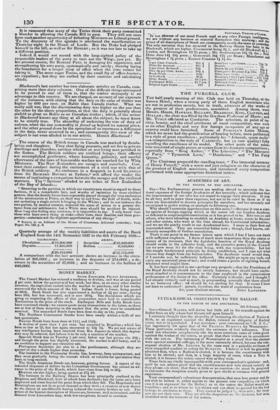ACADEMIES OF ART.
TO THE EDITOR OF THE SPECTATOR.
SIR—The Parliamentary powers are sending abroad to ascertain the na- tional expenses of the foreign Academies of Art severally ; which indicates that the improvement of our own has not ceased to engage their attention. It may be all very well to know these expenses, but not to be ruled by them as if we were too dim-minded to discern principles for ourselves, and too unmanly and un-original to prefer setting an example to following one. Why should I entertain apprehensions on this score?—Because it was a simi- lar species of foreign copying which at the outset left our London Academy so deficient in uniprincipled constitution as it has proved to be. REYNOLDS and others, who were labouring to establish an Academy at home, wrote to BARRY and other artists, who were at the time abroad, for Continental information; and we see the patchy result in our Academical laws. I mean in their first and unamended state. They are somewhat better now ; though, God knows, suf- ficiently susceptible of further emendation. There is one point in my former letters upon which I fear I have not dwelt with sufficient emphasis. I deem of much more importance than the extent or nature of its revenues that the legislative function of the Royal Academy should reside in the collective body, and the executive power in the Conned (as we now term it) for the time being, with due responsibility. Let but this simple fundamental principle be firmly established, and I care not what crosses may dangle from our button•holes. The Academic vessel would then, if I mistake not, be sufficiently ballasted. She might go upon any tack, and carry any occasional press of sail ; and would retain a power of righting herself) whatever wind might blow. It has been suggested to me—perhaps very properly—that the Presidency of the Royal Academy should not be merely honorary, but should have emolu- ment attached to it commensurate to the time employed in the conscientious performance of the duties of the office. Certainly it should ; and I thought I had already virtually said as much, in propounding generally that there should be no honorary office : tel should be too sterling fur that. It seems I have not been so understood : permit, therefore, the word of explanation from


























 Previous page
Previous page